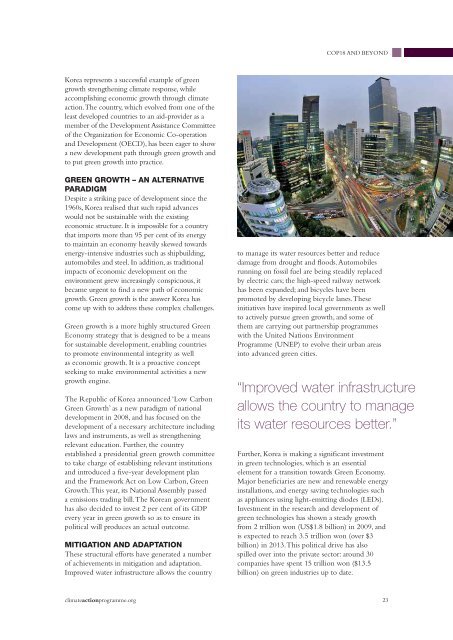Climate Action 2012-2013
You also want an ePaper? Increase the reach of your titles
YUMPU automatically turns print PDFs into web optimized ePapers that Google loves.
COP18 AND BEYOND<br />
Korea represents a successful example of green<br />
growth strengthening climate response, while<br />
accomplishing economic growth through climate<br />
action. The country, which evolved from one of the<br />
least developed countries to an aid-provider as a<br />
member of the Development Assistance Committee<br />
of the Organization for Economic Co-operation<br />
and Development (OECD), has been eager to show<br />
a new development path through green growth and<br />
to put green growth into practice.<br />
GREEN GROWTH – AN ALTERNATIVE<br />
PARADIGM<br />
Despite a striking pace of development since the<br />
1960s, Korea realised that such rapid advances<br />
would not be sustainable with the existing<br />
economic structure. It is impossible for a country<br />
that imports more than 95 per cent of its energy<br />
to maintain an economy heavily skewed towards<br />
energy-intensive industries such as shipbuilding,<br />
automobiles and steel. In addition, as traditional<br />
impacts of economic development on the<br />
environment grew increasingly conspicuous, it<br />
became urgent to find a new path of economic<br />
growth. Green growth is the answer Korea has<br />
come up with to address these complex challenges.<br />
Green growth is a more highly structured Green<br />
Economy strategy that is designed to be a means<br />
for sustainable development, enabling countries<br />
to promote environmental integrity as well<br />
as economic growth. It is a proactive concept<br />
seeking to make environmental activities a new<br />
growth engine.<br />
The Republic of Korea announced ‘Low Carbon<br />
Green Growth’ as a new paradigm of national<br />
development in 2008, and has focused on the<br />
development of a necessary architecture including<br />
laws and instruments, as well as strengthening<br />
relevant education. Further, the country<br />
established a presidential green growth committee<br />
to take charge of establishing relevant institutions<br />
and introduced a five-year development plan<br />
and the Framework Act on Low Carbon, Green<br />
Growth. This year, its National Assembly passed<br />
a emissions trading bill. The Korean government<br />
has also decided to invest 2 per cent of its GDP<br />
every year in green growth so as to ensure its<br />
political will produces an actual outcome.<br />
MITIGATION AND ADAPTATION<br />
These structural efforts have generated a number<br />
of achievements in mitigation and adaptation.<br />
Improved water infrastructure allows the country<br />
to manage its water resources better and reduce<br />
damage from drought and floods. Automobiles<br />
running on fossil fuel are being steadily replaced<br />
by electric cars; the high-speed railway network<br />
has been expanded; and bicycles have been<br />
promoted by developing bicycle lanes. These<br />
initiatives have inspired local governments as well<br />
to actively pursue green growth, and some of<br />
them are carrying out partnership programmes<br />
with the United Nations Environment<br />
Programme (UNEP) to evolve their urban areas<br />
into advanced green cities.<br />
“Improved water infrastructure<br />
allows the country to manage<br />
its water resources better.”<br />
Further, Korea is making a significant investment<br />
in green technologies, which is an essential<br />
element for a transition towards Green Economy.<br />
Major beneficiaries are new and renewable energy<br />
installations, and energy saving technologies such<br />
as appliances using light-emitting diodes (LEDs).<br />
Investment in the research and development of<br />
green technologies has shown a steady growth<br />
from 2 trillion won (US$1.8 billion) in 2009, and<br />
is expected to reach 3.5 trillion won (over $3<br />
billion) in <strong>2013</strong>. This political drive has also<br />
spilled over into the private sector: around 30<br />
companies have spent 15 trillion won ($13.5<br />
billion) on green industries up to date.<br />
climateactionprogramme.org 23












